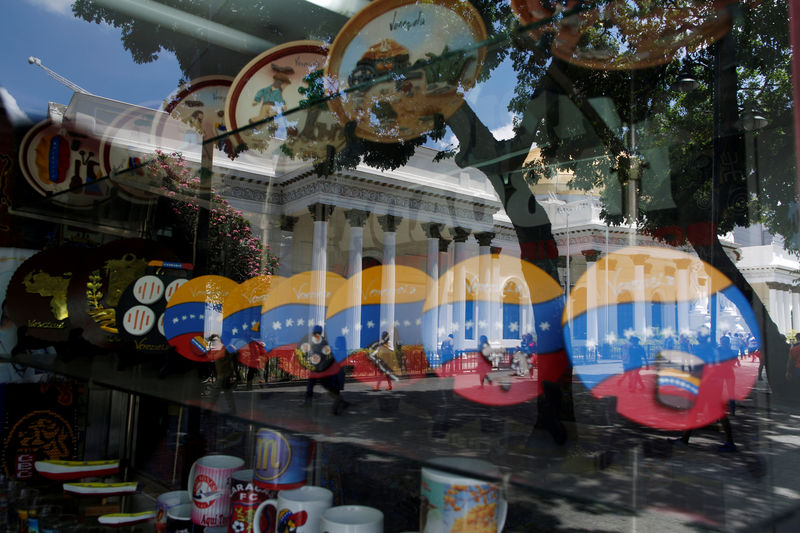By Corina Pons and Mayela Armas
CARACAS (Reuters) - From supermarket checkouts in the capital Caracas to electronics stores in the central city of Maracay, Venezuelans struggling with hyperinflation and a deep economic crisis are turning to a new form of payment: euros in cash.
Runaway inflation that has made even large piles of the local bolivar currency worthless - combined with the socialist government's relaxation of restrictions on the use of foreign currency - has encouraged Venezuelans to turn to dollar bills for everyday transactions in the past year.
But in the past four months, euros have also started proliferating in markets and stores in the South American country.
With the stock of dollars in circulation still far greater than euros, Venezuelan merchants tend to quote items at the same price in the European and U.S. currency - ignoring the euro's higher value on international markets.
"That's just how it works here," said Oscar Ramirez, an electronics trader at the City Market shopping centre in eastern Caracas' Sabana Grande neighbourhood, who was quoting phones at the same price in both currencies.
The increased use of euros follows the United States imposing a series of sanctions on the OPEC nation's oil industry.
With the U.S. financial system closed to state oil company PDVSA, as Washington tries to cripple the finances of Venezuelan President Nicolas Maduro's administration, the company has asked clients to make payments for crude exports in euros.
And with international companies increasingly hesitant to pay using traceable bank transfers for fear of being hit with U.S. sanctions themselves, PDVSA has collected payment for at least two shipments of exported crude in euros cash via intermediaries, according to three oil industry sources, who asked to remain anonymous.
Reuters could not independently confirm details of PDVSA's euro transactions. Neither Venezuela's Information Ministry nor PDVSA responded to requests for comment.
The U.S. dollar has traditionally been the currency used for oil deals globally. But with Washington cracking down on several major oil-producing countries - including Venezuela, Russia and Iran - producers are making an effort to conduct business in other currencies.
Russian state oil company Rosneft, for example, has notified customers that future tender contracts for oil products will be denominated in euros rather than dollars.
PDVSA PAYING CONTRACTS IN EUROS CASH
The oil industry sources said that PDVSA has used euros in cash to pay suppliers and contractors in transactions that previously took place via Venezuelan bank accounts - explaining the broader circulation of European banknotes throughout the economy.
A source from a Venezuelan construction company that has done work for PDVSA, who asked to remain anonymous, said the construction company had accepted payment in euros in cash because it was the only way to charge the state firm.
The source said the construction company - which had previously been paid by PDVSA via Venezuelan bank accounts - then used the euros in cash to pay for lubricants and machine replacement parts from local suppliers.
Other branches of the Venezuelan state are also using euros. According to a source familiar with the deal, Venezuela's Social Security Institute - which supplies the public healthcare network with medicine - paid a vaccine provider in euros in cash in July. The institute did not respond to a request for comment.
LAWMAKERS CONCERNED
While the use of euros in cash in Venezuela is not illegal, opposition lawmakers are concerned that cash could be used to hide illicit money flows that would be easily traceable if payments were made electronically, said Chaim Bucaran, an opposition congressman.
"Organizations have paid for imports, medicines and food in euros," said Carlos Paparoni, another opposition lawmaker, adding that the National Assembly's finance commission was planning an investigation into the origins and uses of cash euros in Venezuela.
He said the committee had detected some private airplanes bringing in euros in cash to Venezuela. He did not provide further details and Reuters was not independently able to verify that information.
One of the oil industry sources said several companies that had accepted payment in euros in cash had been providing services to PDVSA for less than a year.
He added that the practice was limited to fields PDVSA operated on its own, rather than its joint ventures with foreign companies like U.S. oil major Chevron (N:CVX) and China National Petroleum Corp (CNPC).
Chevron declined to comment. CNPC did not respond to requests for comment.
The sources declined to name the companies receiving payment in euros, but said most were small.
PDVSA has offered to pay larger, more established suppliers in euros via bank transfer, according to two of the oil industry sources, though it is not clear whether the companies accepted.
The oil industry is not the only source of the euros. The central bank has received euros in cash for the sale of some of its gold reserves, a source with knowledge of the situation told Reuters in January.

The central bank this year began giving Venezuelan financial institutions foreign exchange in cash rather than via transfer, five finance sector sources said this year.